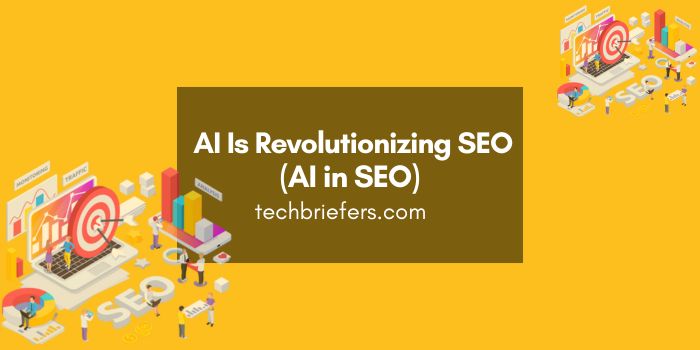How AI Is Revolutionizing SEO: AI in SEO

Search engine optimization (SEO) has seen tremendous advancements and continues to evolve. SEO tools and techniques that are trending today could fall into obscurity tomorrow. AI can enhance the effectiveness of SEO techniques and tools, and has the potential to transform the digital landscape. AI can help digital marketers uncover hidden insights to understand consumer behavior patterns better.
These are some of the ways AI is revolutionizing SEO.
AI is changing the way search engines crawl and index websites.
Unlike traditional search algorithms, which rely heavily on keyword density and algorithms, advanced AI algorithms analyze several factors, including content quality and keyword context, to personalize and refine search results. AI uses metrics from user interactions to analyze their website experience. A thorough analysis of the user experience allows AI to deliver more accurate and relevant search results.
Content creation and optimization
AI tools can be used to create content by generating high-quality, optimized blog posts and articles on a large scale. AI analyzes user behavior to deliver personalized content, allowing digital marketers to engage with their target audience. Personalized content can also help reduce bounce rates.
Many content creators use AI to identify the right keywords, optimize meta tags, and improve content readability. Compelling content with relevant keywords can help improve search rankings. With AI, digital marketers can now automate time-consuming tasks like keyword research and content optimization. AI also helps understand the semantic relationships between keywords.
Content creators must focus on user intent and write in a natural, conversational tone to make content more engaging and relevant.
Also Read: Top 13 Free Keyword Research Tools for SEO
Voice Search Optimization
Voice search is more convenient than traditional text searches. Thanks to advancements in NLP (natural language processing), voice search is slowly but surely gaining popularity. Digital marketers should optimize their content for voice queries, ensuring it is more conversational and question-based. AI can be used to automate the implementation of structured data, optimizing content for voice search.
Predictive analytics
AI can be used to understand user intent. Once digital marketers understand user intent, they can align their content with it to attract qualified traffic and improve search engine rankings. Marketers can use AI to predict future trends, analyze user behavior, and detect possible changes in search engine algorithms.
Improved user experience
The user experience on a website can be defined. Simply “good” is no longer enough. You have to ensure your website provides a great user experience. AI analyzes user behavior data to suggest measures to optimize UX (user experience).
You can provide personalized content recommendations based on user preferences, helping ensure they get the information they’re looking for and stay on your website longer. AI chatbots can provide real-time help to your site visitors who are experiencing difficulties, improving their experience.
Automation of SEO tasks
AI can handle key SEO tasks like keyword research, backlink tracking, and competitor analysis. It also helps track algorithm changes and recommends ways to boost or preserve search rankings.
Visual search optimization
Google Lens, Pinterest Lens, and other platforms allow users to search for information through images rather than text. AI-powered image recognition technology can identify objects within images to help search engines understand and index visual content. To take advantage of image search, digital marketers should use AI to optimize their images.
Also Read: ChatGPT vs Bing Chat: Which One to Choose?
Preparing for the Age of AI
AI is transforming SEO. AI tools support digital marketers by automating SEO processes and enhancing user experience across websites.
Every digital marketer should take the time to learn about recent AI advancements that could impact SEO.
Content creators must focus on user intent and write in a natural, conversational tone to make content more engaging and relevant. They should focus on content that answers specific user questions, as AI prefers content that accurately answers questions. You can use structured data to help AI understand the relationships within your content. This improves the chances of your content appearing in featured snippets or knowledge graphs.
In conclusion
There’s no denying that AI is revolutionizing the SEO landscape. From improving the way search engines crawl and index websites to streamlining content creation and improving user experience, AI offers a host of tools and techniques that digital marketers can leverage. By automating time-consuming SEO tasks, optimizing for voice and visual searches, and utilizing predictive analytics, AI helps digital marketers stay ahead of the curve.
As we enter the AI era, it’s essential for digital marketing professionals to stay informed about the latest advancements and integrate AI-powered strategies to maintain and improve their search engine rankings. Adopting AI in SEO not only streamlines processes but also ensures a more personalized and effective method for reaching and capturing target audiences.







Leave a Reply